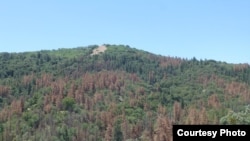Nearly all forests in the United States are under threat from climate change, new research indicates.
Writing in the journal Global Change Biology, researchers from 14 institutions say higher temperatures and changing precipitation patterns are happening so fast the forests do not have time to respond.
The researchers say that we are already seeing the effects in the West, where bark beetles and wildfires are impacting forests. They added that climate models show a likelihood that droughts will become “more severe, frequent and prolonged” over much of the country.
"Over the last two decades, warming temperatures and variable precipitation have increased the severity of forest droughts across much of the continental United States," said James S. Clark, lead author of the study and Nicholas Professor of Environmental Science at Duke University.
"While the effects have been most pronounced in the West, our analysis shows virtually all U.S. forests are now experiencing change and are vulnerable to future declines," he said. "Given the high degree of uncertainty in our understanding of how forest species and stands adapt to rapid change, it's going to be difficult to anticipate the type of forests that will be here in 20 to 40 years."
Clark added that forests in the Eastern U.S. are particularly vulnerable.
"Prolonged drought affects wildfire risks, species distribution, forest biodiversity and productivity, and virtually all goods and services provided by forests, so there is a pressing need to know what is happening now, what might happen in the future and how we can manage for these changes," Clark said.
He added that while there is a good understanding of how climate change effects individual trees, there is “still uncertainty about what might happen at the species-wide or stand-wide levels, particularly in Eastern forests.”
“These are the scales where we really need reliable predictions so forest managers can take steps now to help reduce large-scale problems," he said.





